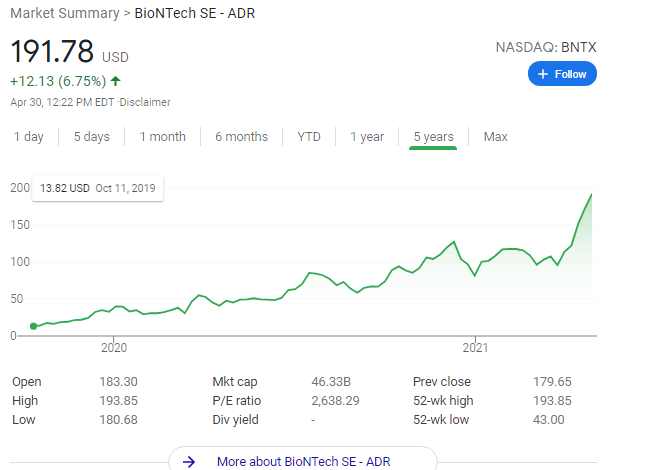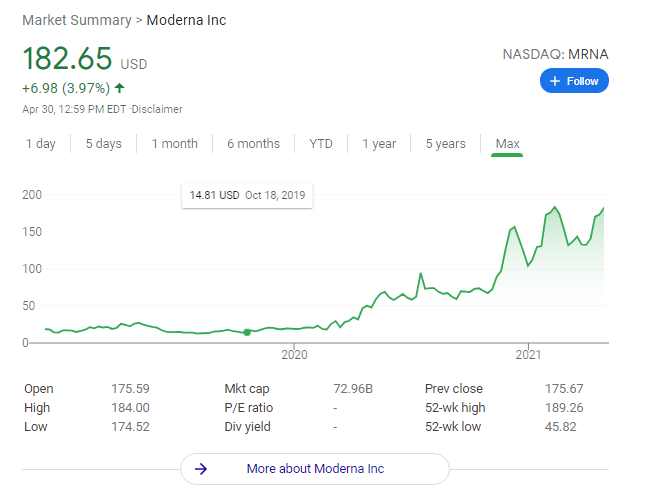Bill Gates turned his $55 million vaccine investment in Pfizer’s partner, BioNTech, into over $550 million in just under two years

Who said saving lives is not a lucrative business? Pharmaceutical giant Pfizer has been making the headline news since the coronavirus pandemic early last year. The New York-based Pfizer was founded in 1849 by Christina Warren. Today, the 172-year old company is the world’s largest pharmaceutical company and was ranked 64th on the 2020 Fortune 500 list of the largest U.S. corporations by total revenue, at $47.644 billion as of December 31, 2020. Pfizer is one of the three leading Pharmaceutical companies working on mRNA vaccines to put an end to the deadly coronavirus.
But what most people don’t know are the two other companies behind the mRNA vaccines. Moderna and BioNtech are two biotech startups founded in 2008 and 2010 respectively, with the stated goal of pioneering messenger RNA (mRNA) therapies to the world of healthcare. These two companies are one of the success stories of the coronavirus pandemic.
The Cambridge, Massachusetts-based Moderna Therapeutics was co-founded by a Beirut-born, MIT-educated biochemical engineer, Noubar Afeyan, and other co-founders: Derrick Rossi, Kenneth Chien, Robert Langer, Stephane Bancel, and Timothy A. Springer. Moderna specializes in drug discovery and drug development based on messenger RNA.
BioNTech SE is a German biotech startup based in Mainz, Germany that develops and manufactures active immunotherapies for patient-specific approaches to the treatment of diseases. It was founded by CEO Uğur Şahin, Özlem Türeci, and Christoph Huber. We’ve written extensively about BioNTech over the years.
Prior to the COVID-19 pandemic in December 2019, Moderna and BioNtech had never produced or launched a single product. Today, Moderna’s vaccine has propelled its market capitalization to $67 billion. BioNtech, which later partnered with Pfizer to develop mRNA vaccines, is now valued at over $46.33 billion (see market chart at the bottom of this page).
Both the Moderna and Pfizer/BioNTech vaccines use mRNA technology. Pfizer’s mRNA technology was developed by BioNTech. Unlike the traditional live-attenuated or viral-vectored vaccines, the mRNA is non-infectious and poses no concern for DNA integration—mainly because it cannot enter the nucleus which contains DNA. The mRNA molecules are used to instruct the body to produce its own immune response to fight a range of different diseases.
In addition, the mRNA vaccine can potentially be developed and produced more quickly than traditional vaccines. The efficacy of mRNA vaccines also turned to be higher than the traditional vaccines. For example, traditional vaccines developed by Johnson & Johnson and Oxford/Astrazeneca with trial results showing around 70% efficacy, the mRNA vaccines developed by the two companies were more than 90% efficient.
With success comes the opportunity to raise more money. And investors surely didn’t disappoint. Money started pouring in from the government, venture capitalists, and private investors. In April 2020, the US government decided to invest in Moderna’s unproven, but potentially innovative, mRNA vaccine technology. This risky government-private-backed partnership began with an initial $483 million of government investment. Today, that investment has risen to more than $4.5 billion. Today Moderna now has a market capitalization of $76 billion (see screenshot below), at the time of writing.
Moderna is not alone. In September of 2019, Bill Gates initially invested $55 million on a pre-IPO equity investment into BioNtech. Gates’s investment in BioNtech may probably higher. Today, Gates’ investment is now worth over $550 million dollars, based on the company’s market cap at the time of writing.
In a news release titled, “Bill & Melinda Gates Foundation invests $55 million in an infectious disease collaboration that could reach up to $100 million in total funding,” BioNTech co-founder and CEO Prof. Ugur Sahin said:
“We are thrilled about the partnership with the Gates Foundation and the outstanding network of infectious disease specialists that it has built.”
Meanwhile, BioNtech is not the only vaccine maker Bill Gates has invested in. As Fool.com also wrote, Microsoft co-founder through his Bill & Melinda Gates Foundation, also invested in three other coronavirus vaccine stocks Pfizer, CureVac, and Vir Biotechnology.
Per Fool.com, in 2015, his foundation invested $52 million in CureVac. In addition, the Gates Foundation agreed to provide separate funding for several projects to develop vaccines based on CureVac’s messenger RNA (mRNA) platform. The Gates Foundation was also one of the lead investors in Vir Biotechnology at the biotech’s launch in late 2016 and early 2017.
In 2011, Gates said that vaccine investment offers the best returns, according to a report from Reuters. “Vaccines are one of the best investments that we can make in the future,” Gates said.
In closing, even though the delivery of life-saving vaccines is critical to bring an end to the ongoing coronavirus pandemic, Gates’ investments in pharmaceutical giants and vaccine makers may be seen by his critics as an opportunity to make billions at the detriment of millions of people suffering from the virus. Besides, his investment in these companies may give the critics the ammunition they need to challenge his motives.

Moderna stock chart.


